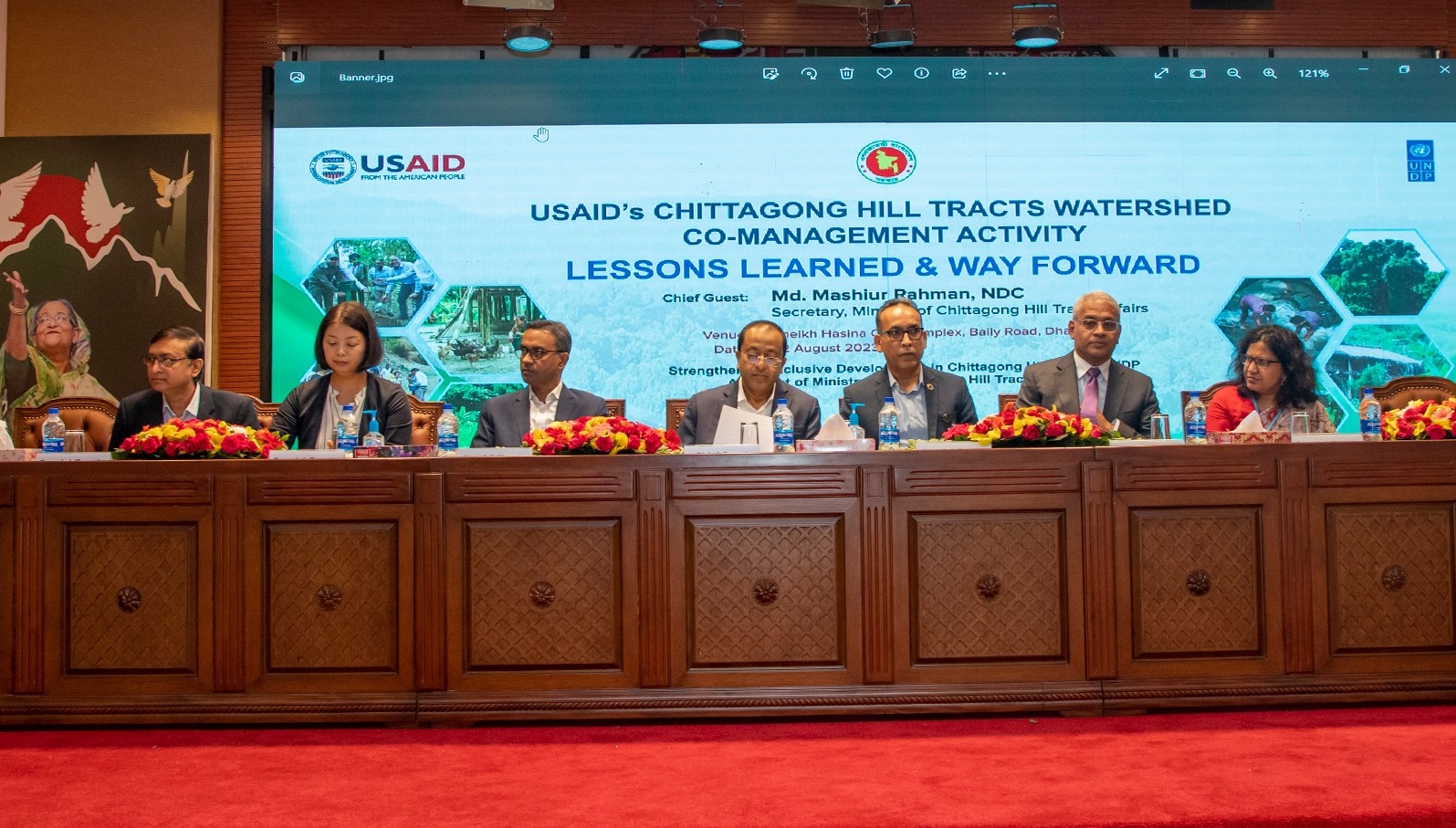Collaborative Efforts Strengthen Conservation and Address Water Crisis in Chittagong Hill Tracts
USAID and UNDP work together with the government to save forests, conserve water in CHT
August 22, 2023

Md Mashiur Rahman, Secretary of the Ministry of Chittagong Hill Tracts Affairs, Sonali Dayaratne from UNDP Bangladesh, and Muhammad Khan from USAID, along with other key stakeholders, discuss watershed management strategies at the 'Lessons Learned and Way Forward' workshop in Sheikh Hasina CHT Complex, Dhaka.
Experts from various fields stressed the importance of protecting the forest to solve the water crisis in the Chittagong Hill Tracts at the “Lessons Learned and Way Forward” workshop at Hasina CHT Complex in Dhaka on 22 August.
Speaking at the workshop as the chief guest Md Mashiur Rahman, Secretary, Ministry of Chittagong Hill Tracts Affairs, said, “The Chittagong Hill Tracts have favourable climate and environmental factors for restoring natural ecosystems, including forests and water bodies. However, factors such as climate change and the growing demands of the developing economy are increasing biotic pressure on the CHT forest ecosystems.”
The project's primary focus has been on uniting stakeholders to manage watersheds comprehensively. Participants of the workshop engaged in dynamic discussions, sharing success stories and insights derived from implementing integrated watershed management practices. These practices have not only bolstered community and ecosystem resilience to climate change but have also promoted sustainable resource management within the region.
In her remarks, Sonali Dayaratne, Deputy Resident Representative, UNDP Bangladesh, said, “Central to our mission is the elevation of conservation awareness. Through educational initiatives, outreach programs, and capacity-building endeavours, we have instilled a deep-seated understanding of the vulnerability of our ecosystems and their indispensable role within the broader fabric of life.”
Muhammad Khan, Economic Growth Office Director, USAID Bangladesh, attended the workshop as a special guest. He said, “Ecosystem conservation and management is critical to ensure CHT’s long-term resilience. USAID continues to consider CHT as one of its priority regions.”
During the workshop, speakers highlighted community involvement in formulating and implementing conservation projects. The integration of local knowledge into project planning is a critical factor for achieving lasting outcomes. Government representatives and CHT institutions also examined policy landscapes and institutional frameworks necessary to maintain and expand successful participatory watershed management practices. Aligning project goals with broader CHT development objectives and policies was underscored as paramount for sustained progress. A strategic roadmap for watershed management was also mapped out as a way forward.
Under this initiative, USAID and UNDP worked together to enhance climate and ecological security in CHT, collaborating closely with local communities to build resilient livelihoods and community-based forest management systems.
Funded by USAID and executed by UNDP Bangladesh in collaboration with its local and government partners, Chittagong Hill Tracts Watershed Co-Management Activity (CHTWCA) of Strengthening Inclusive Development in Chittagong Hill Tracts (SID-CHT) project has established itself as a pioneering project in integrated watershed co-management. CHTWCA was initiated in August 2013, and supported community-government co-led conservation efforts in nearly 65,000 hectares of Village Common Forests, Reserved Forest and Protected Areas. CHTWCA partnered with the Ministry of Chittagong Hill Tracts Affairs, Ministry of Environment, Forest and Climate Change, Hill District Councils, Bangladesh Forest Department, Ashika, Tahzingdong, and Trinamul.
For Bangla Click Here
Uniting stakeholders for a greener future: Integrated watershed management practices pave the way for sustainable development in Chittagong Hill Tracts.

 Locations
Locations


